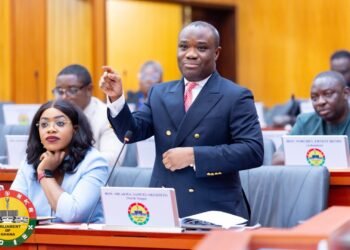In the hallowed chambers of Ghana’s Parliament, a disconcerting challenge looms large – a relentless wave of attrition that poses a threat to stability and institutional memory.
The frequent turnover of Members of Parliament (MPs) has emerged as a conspicuous trend, casting shadows over the legislative process and impeding the continuity of policies and projects.
The reasons behind this attrition are as varied as the individuals who grace the parliamentary halls. Factors such as career transitions, pursuit of alternative opportunities, and electoral defeat collectively contribute to the ebb and flow in parliamentary membership. Additionally, some MPs grapple with the challenge of reconciling their roles with other commitments, leading to resignations that further add to the parliamentary turnover.
Johnson Asiedu, the National Chairman of the National Democratic Congress (NDC), attributes the high attrition rate to the monetization of Ghana’s politics.
He laments the shift from a noble duty of serving the nation through law formulation to a scenario where parliamentary privilege is exploited to recoup campaign investments and further personal business interests.
As Asiedu notes, this evolution in motives has led to a decline in the quality of representation within the legislative house.
And I believe that one of the main causes has been the over monetization of our politics. In the past, people went to parliament out of the desire to serve the nation. Now it is increasingly becoming clear that there are lot of people who go to parliament as a form of investment.

“The truth of the matter is that, whenever, anybody spends five times the emoluments for the four year term, and yet you spend that money to go to parliament, where is he going to get the balance from?”
Johnson Asiedu Nketia
In a bid to illuminate this issue, Asiedu refers to a comparative research study conducted by an Englishman on the three parliaments: the first, second, and third. Surprisingly, the second parliament, marked by the absence of the New Patriotic Party (NPP), emerged as the most productive. The first parliament, also NPP-free, followed closely, while the third parliament, encompassing the NPP, was deemed the least productive. Asiedu underscores that the quality of representation has been on a downward trajectory, with over-monetization identified as a primary cause.
NDC’s Former Strategy Recounted
He recounted the NDC’s past practice of maintaining high-performing parliamentarians through a comprehensive assessment system. The party leadership, national executive, and constituency executives collectively evaluated MPs’ performances, categorizing them into “must maintain,” “must change,” and a middle belt for primary contests. Asiedu emphasized that this system, though abandoned in favour of the NPP’s Electoral College, served as an effective means of ensuring a qualified and committed parliamentary cohort.

“And then when NPP came and introduced the Electoral College where anybody could contest, our people started to compare and demanded that their system was better so we should all go that way. And that is how come we abandoned. It also be said that the level of party leadership, like the NDC was formed after the government, at the time which the former President Rawlings exercised influenced the decisions greatly.”
Johnson Asiedu Nketia
“It is different from what can be done today”, he added.
The consequences of the high turnover are tangible, impacting institutional memory and hindering the effectiveness of parliamentary proceedings. To counteract this challenge, there is a pressing need for proactive measures. Mentorship programs, institutionalized training for new MPs, and efforts to enhance the attractiveness of parliamentary service are potential strategies to foster stability and commitment among parliamentarians.
Ghana’s Parliament faces a critical juncture as it grapples with the attrition puzzle ahead of the 2024 General Elections.
The insights from Asiedu and the historical practices of the NDC shed light on potential avenues for reform.
READ ALSO: Minority’s Reaction To The Triumvirate’s Sign-Off “Nkunim-Victory” Budget























